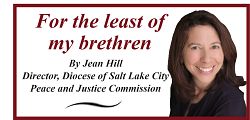Care is Needed When Religion Influences Politics
Religion and its many practices can be forces for good. Prayer and discernment enhance personal and institutional decision-making by helping us focus not just on pros and cons, but on broader principles such as the dignity of every human impacted by our decisions. Unfortunately, religious teachings are also far too often distorted to justify self-serving and sometimes even dangerous political maneuvers.
We see this throughout our nation. Christianity, for example, has been distorted to support a belief that wealth is a gift from God, and that wealthy people are, therefore, somehow morally superior. This belief is held despite Scripture’s constant reminder of God’s command that we care for the poor, and Jesus’ teaching that “it is easier for a camel to go through the eye of a needle than for someone who is rich to enter the kingdom of God.”
Wealth does not equate to moral superiority. Rather, our moral bearing is reflected in how we obtain and use any wealth we may have.
Thus, when I hear preachers of a prosperity gospel calling for more religion in public life, I fear that distortions of faith will prevail, giving political leaders pseudo-religious cover for immoral acts or plain bad public policy that favors wealthy special interests over the common good. Using religion to justify policies that punish people for being poor based on some view that poverty is a sign of God’s disfavor will not move our nation in a direction that Catholic teaching would support. Rather, our faith asks us to judge political decisions by the impacts on the poorest of our fellow humans.
Any person of faith who lives in a state with a majority religion, whether the religion is The Church of Jesus Christ of Latter-day Saints, Catholic or Evangelical, understands the negative and positive impacts of religion on public life. Abuse of religion can create a level of division and mistrust in communities that takes decades to even begin to overcome.
On the other hand, we speak as a diocese on a host of political issues to bring a moral perspective to a table that might otherwise only serve economic interests. Our Catholic voice in support of immigration reform, restorative justice, prioritizing moving people out of poverty, and protecting the rights of people of faith to practice their beliefs is critical. But to say the majority religion in this country at any given time should be allowed to force children in public schools to pray that religion’s way or to determine which residents deserve to be treated with dignity may be extremely detrimental to religious freedom in the long term. Speaking truth to power is one role for the various faiths in our nation; becoming the power is a whole different game we should approach with caution.
Utah demonstrates how religion can work in the public sphere, and mistakes to avoid. We have learned through much trial and error to respect differences amongst our residents, whether those differences are religious, cultural or based on sexual orientation or other characteristics. Our state, along with others that have had substantial religious majorities in public leadership positions, could teach the rest of the nation much about the dangers of imposing a religion on all residents and the benefits of ensuring the right to live out our beliefs across the religious spectrum.
As Utah illustrates, it is when we embrace our differences and seek to learn from one another, speaking both faithfully and with open ears to hear from others, that we thrive.
Jean Hill is director of the Diocese of Salt Lake City Office of Life, Justice and Peace. Reach her at jean.hill@dioslc.org.
© Copyright 2024 The Diocese of Salt Lake City. All rights reserved.


Stay Connected With Us